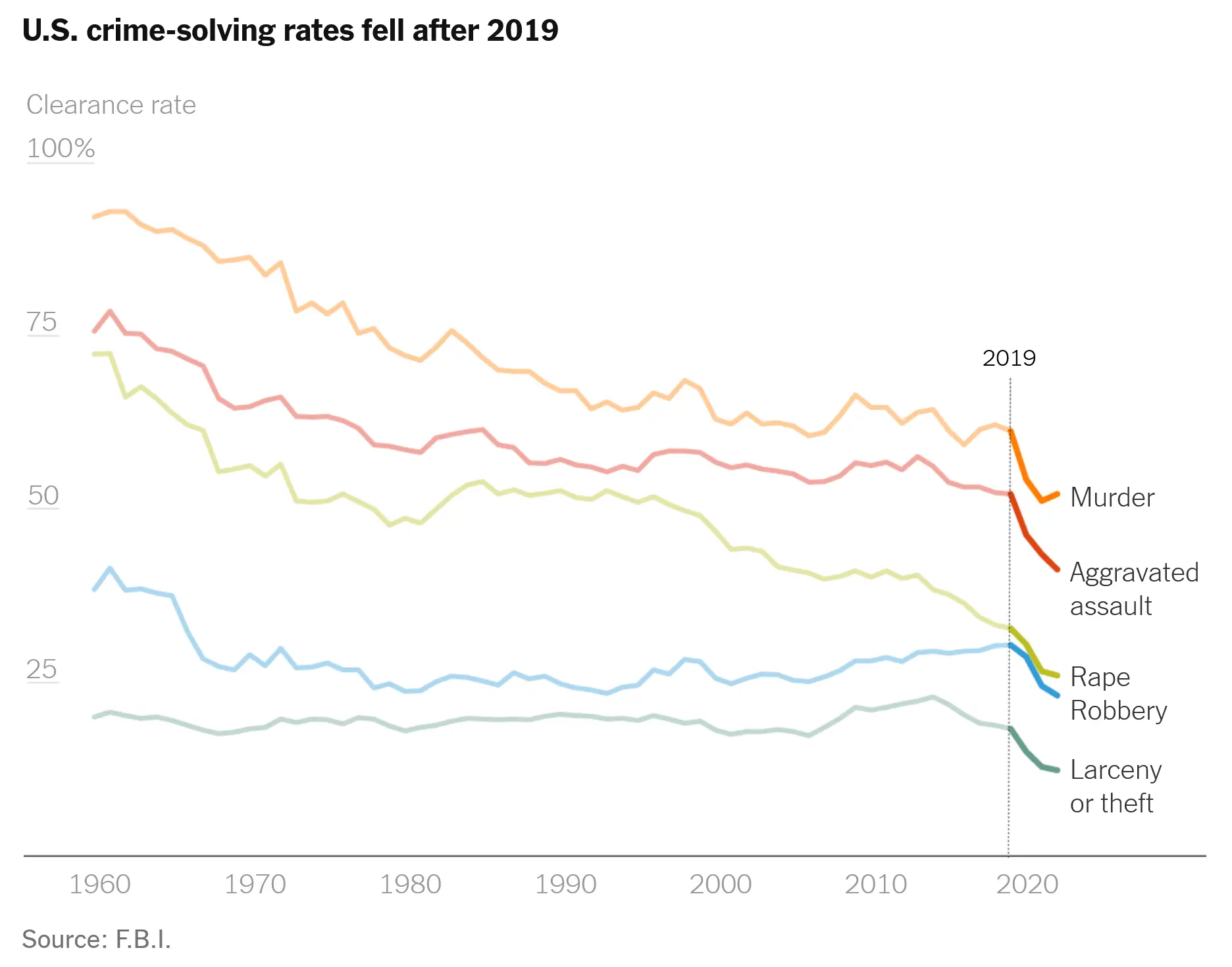While headlines tend to focus on falling clearance rates in large liberal cities, the decline occurred nationwide in both red and blue cities, counties and states. The violent crime clearance rate, for example, fell considerably between 2019 to 2022 in big cities, which tend to be led by Democrats, as well as in small cities and suburban and rural counties, which tend to be led by Republicans.



It’s not necessarily the case though that fewer crimes are being actually “solved,” in the most precise sense of the term.
It could be that the current heightened interest in police oversight and focus on investigation of (and huge lawsuit payouts as a consequence of) wrongdoing by the police has made it less likely that people will be railroaded/framed for crimes they didn’t actually commit, so the rate at which crimes are marked as solved has declined, even as the rate at which they actually are solved hasn’t.
That’s definitely a big chunk of the drop in case clearance rates since the 1960s. It’s not as clear that there have been actual changes to police honesty recently though.
It struck me after I posted that that modern technology and investigative techniques would also contribute to such a decline.
It’s undoubtedly more difficult to falsely convict someone (whether deliberately or not) in the era of GPS, cell phone records, video surveillance and DNA tests.
There’s a famous example of how improvements in understanding of burn patterns resulted in concluding that a bunch of people were falsely convicted for arson:
Don’t credulously accept the testimonies of expert witnesses. Examples of “the science” proving years later to have been pseudoscience abound.
Ding ding ding ding ding! This is exactly the case.
The police are merely getting away with less corruption and misconduct. The metric “solving crimes” has ALWAYS been a red herring.
While this certainly sounds plausible, even rational and perfectly logical, it’s also the exact sort of argument that could easily be spurious. Now, i’m not making that accusation (nor do mean to imply it), but do you happen to have any data backing up this assertion?
Eh?
I said that it’s “not necessarily the case that” one thing and “it could be that” something else.
Logic and plausibilty are all that’s necessary.
when asking for evidence, i didn’t expect equivocation and, “it’s just a guess, bro,” hand-waving in response-- see, this is why i was skeptical and asked.
no. evidence is necessary. otherwise, it’s just speculation, and that’s just not good enough.
What the fuck are you on about?
That’s everything I said, right there. What part of it are you not understanding?
Of course it’s fucking speculation! What the fuck else did you think it was?!
It would be equivocation if there was a disjunct between the intended meaning of what I said at one point and the intended meaning of the same thing at some other point.
But I’ve been entirely consistent in what I’ve said. The disjunct is between what YOU thought I meant and what I actually said, and that’s your fucking problem - not mine.
Yeah, I’m not reading that hissy fit. When you make assertions, back it up with evidence. If it’s just a guess, say so.
They did say so, from the start.
Then it should be easy for you to show me the quote where they said it was just guess.
“It could be” is a direct quote from their second sentence.
In my anecdotal case, the dipshit police here weren’t able to pull over people of color without dragging them out of the car and beating them (they lost a lawsuit) so they literally don’t pull anyone over for anything anymore, and people have figured it out.
A year later, and people just run stop signs, red lights, speed everywhere, etc. We just had a fatal crash yesterday from someone running a red light at 15 over the speed limit. So while it’s popular to hate police, they literally won’t even do the bare minimum anymore to keep people safe.